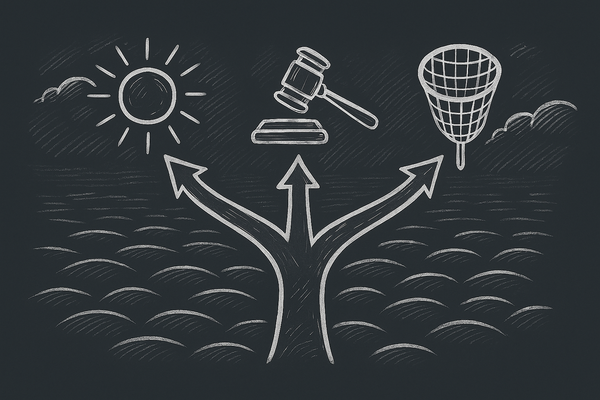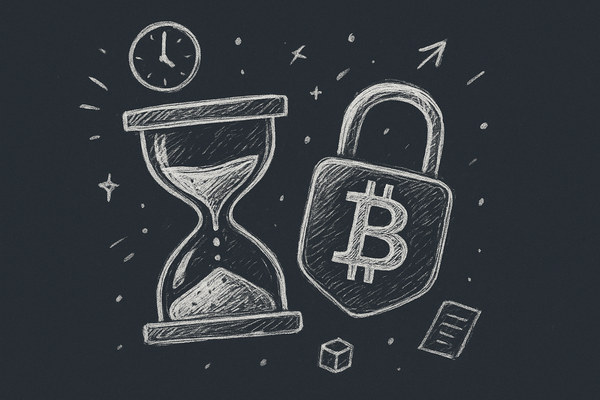Bitcoin, Savings, Luxury Assets, and the Case for Professional Escrow
Bitcoin is maturing from savings to settlement. Tetrapolar brings centuries-old escrow into the Bitcoin era, making high-value deals safe, discreet, and non-custodial.

My name is Yuri. I’ve been working in the Bitcoin space since 2012 — brokerage, Bitcoin ATMs, consulting — long enough to see trends come and go, and to understand how the technology holds up when people’s real money is on the line.
Over that time, I’ve watched Bitcoin grow from tiny weekly meetups of nerds to full government and corporate adoption. I’ve lived through bull markets (the highs), bear markets (the lows), and have seen first-hand how both affect people’s mental states and decision-making. That experience gives perspective.
Bitcoin is money. First and foremost. Because there will only ever be 21 million bitcoins, it has a scarcity baked in that no fiat currency can match. If you are going to save, save in Bitcoin. Its upside over decades is almost unmatched.
That doesn’t mean life stops at saving. Expenses exist. Ambitions exist. And increasingly, Bitcoin is being used as a medium of exchange. Today, many goods and services are payable directly in Bitcoin — more than ever before.
As governments and companies put Bitcoin on their balance sheets, legitimacy increases. Those who were previously unsure are now dipping toes or even going all in.
Many early Bitcoiners have already built substantial wealth. They want to enjoy that wealth — to live, to travel, to own beautiful things: homes, cars, yachts, perhaps even aircraft. It’s natural they would want to pay in Bitcoin for those things.
Likewise, many people who own such luxury assets are seeing Bitcoin’s rise and assessing whether they want in. Selling their yacht, real estate, or car for Bitcoin is not just symbolic — it can be a smart hedge. Furthermore, producers of luxury goods are also considering putting Bitcoin on their balance sheets, and selling their high-end products directly for Bitcoin becomes a natural extension of that thinking.
We’ve already seen Bitcoin used in luxury transactions. In Dubai, for example, more than 500 properties worth a combined $500 million were reportedly sold for cryptocurrency back in 2022. Yet in most of these cases, the "crypto" was simply converted into fiat and then wired to the seller. Direct Bitcoin settlement — where Bitcoin remains Bitcoin all the way through — is still rare.
Direct Bitcoin settlement — where Bitcoin remains Bitcoin throughout — is still rare. Most “crypto real estate” deals still convert crypto to fiat for the seller. But that’s changing.
I’ve personally paid in Bitcoin for six-figure assets. But when you reach the multimillion-dollar scale, new risks emerge: counterparty fraud (buyers or sellers misrepresenting condition, ownership, or intention), disputes over delivery, escrow abuse, regulatory ambiguity, and the danger that large transfers are made without sufficient legal or contractual guardrails.
Escrow is not new. It has centuries of history: from medieval merchants who needed trust in long-distance trade, to modern real estate closing services. Tradfi companies like California Escrow Group, Granite Escrow & Settlement Services, Title Financial Corporation, CW Title & Escrow, and Escrow Options Group have built strong reputations handling complex, high-value transactions in real estate and business transfers.
Tetrapolar adapts the escrow mechanism for the Bitcoin era. We use multisignature setups (multisig) where buyer and seller each hold keys, and Tetrapolar only becomes the third key in case of dispute, loss, or legal necessity. Funds are never under unilateral control. Guarantees of trust, non-custodial operation, and flexibility: these are our pillars.
The next few years will be amazing for Bitcoin’s adoption. Tetrapolar exists to make direct Bitcoin settlement safe for high-value deals. If this future excites you as much as it excites us, we’ll see you there.





